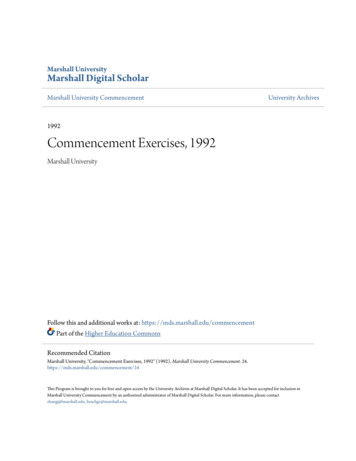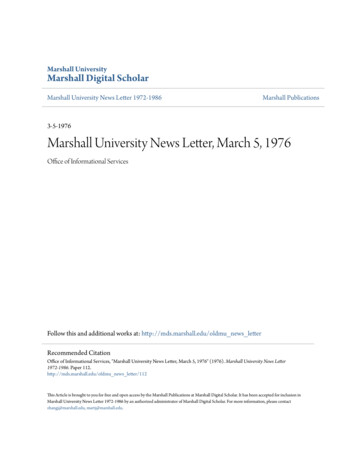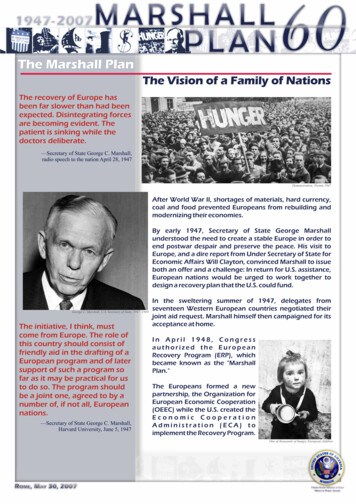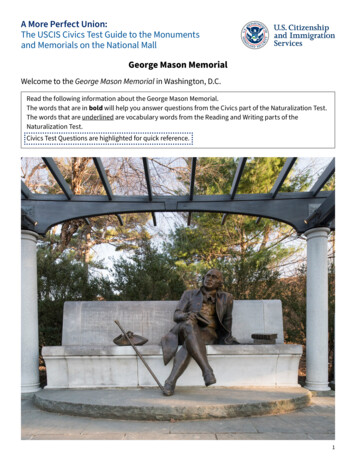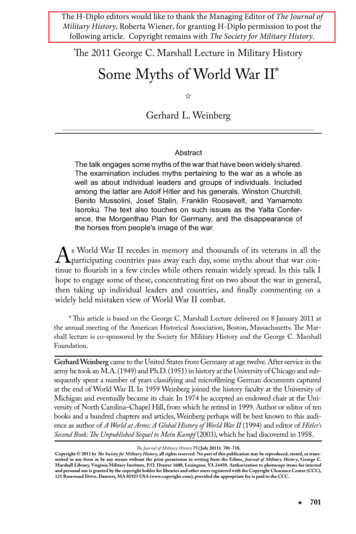
Transcription
The H-Diplo editors would like to thank the Managing Editor of The Journal ofMilitary History, Roberta Wiener, for granting H-Diplo permission to post thefollowing article. Copyright remains with The Society for Military History.The 2011 George C. Marshall Lecture in Military HistorySome Myths of World War II*IGerhard L. WeinbergAbstractThe talk engages some myths of the war that have been widely shared.The examination includes myths pertaining to the war as a whole aswell as about individual leaders and groups of individuals. Includedamong the latter are Adolf Hitler and his generals, Winston Churchill,Benito Mussolini, Josef Stalin, Franklin Roosevelt, and YamamotoIsoroku. The text also touches on such issues as the Yalta Conference, the Morgenthau Plan for Germany, and the disappearance ofthe horses from people's image of the war.As World War II recedes in memory and thousands of its veterans in all theparticipating countries pass away each day, some myths about that war continue to flourish in a few circles while others remain widely spread. In this talk Ihope to engage some of these, concentrating first on two about the war in general,then taking up individual leaders and countries, and finally commenting on awidely held mistaken view of World War II combat.* This article is based on the George C. Marshall Lecture delivered on 8 January 2011 atthe annual meeting of the American Historical Association, Boston, Massachusetts. The Marshall lecture is co-sponsored by the Society for Military History and the George C. MarshallFoundation.Gerhard Weinberg came to the United States from Germany at age twelve. After service in thearmy he took an M.A. (1949) and Ph.D. (1951) in history at the University of Chicago and subsequently spent a number of years classifying and microfilming German documents capturedat the end of World War II. In 1959 Weinberg joined the history faculty at the University ofMichigan and eventually became its chair. In 1974 he accepted an endowed chair at the University of North Carolina–Chapel Hill, from which he retired in 1999. Author or editor of tenbooks and a hundred chapters and articles, Weinberg perhaps will be best known to this audience as author of A World at Arms: A Global History of World War II (1994) and editor of Hitler'sSecond Book: The Unpublished Sequel to Mein Kampf (2003), which he had discovered in 1958.The Journal of Military History 75 ( July 2011): 701-718.Copyright 2011 by The Society for Military History, all rights reserved. No part of this publication may be reproduced, stored, or transmitted in any form or by any means without the prior permission in writing from the Editor, Journal of Military History, George C.Marshall Library, Virginia Military Institute, P.O. Drawer 1600, Lexington, VA 24450. Authorization to photocopy items for internaland personal use is granted by the copyright holder for libraries and other users registered with the Copyright Clearance Center (CCC),121 Rosewood Drive, Danvers, MA 01923 USA (www.copyright.com), provided the appropriate fee is paid to the CCC. 701
GERHARD L. WEINBERGOne myth about the war that has been disseminated is that the victory ofthe Allies was the result of their overwhelming superiority in human and materialresources. This view would have elicited bitter laughter from those actually engagedin the fighting at critical turning points in the conflict. It is true that Britain wasproducing more planes per month than Germany at the time of the Battle ofBritain, but the notion that the victory of the Royal Air Force was the productof vastly greater numbers than the German air force’s is preposterous since thosevastly greater numbers did not exist.1 When the Red Army halted the Germanadvance in 1941 it did have greater numbers, but these had been nullified by theprior decimation of its leadership by Stalin’s purges.2 Contrary to the fabricationsin German military memoirs, a subject I shall return to, Stalin did not control theweather. It was invariably as cold and the snow was as deep on the Russian as onthe German side of the front; temperatures and snow were not subject to the Sovietleader’s control as the front lines shifted. Furthermore, there is a winter in Russiaevery year; it is not something that the government in Moscow or St. Petersburgarranges when there are Swedish, French, or German invaders in the country.It is now time to turn to the Battle of Midway. Mathematics was never my strongpoint, but there cannot be any doubt that eight aircraft carriers are more numerousthan three. I shall return to the alleged competence of Japanese commander Yamamoto Isoroku subsequently, but even the four carriers allotted by him to the criticalengagement were more, not less, numerous than the three American ones, quite asidefrom the fact that one of the American ones, the Yorktown, had been damaged in theBattle of the Coral Sea and was still in the process of being repaired.3The wider issue of resources also needs a more careful look. By the summer of1942 the resources of the area under the military control of the Axis powers werein no way substantially inferior to those controlled by the Allies. One ought not toexclude the possibility that it was the mobilization and organization of resources,and not merely their availability, that made a substantial difference in the fieldingof effective forces for combat.4 In many ways the Allies proved vastly superior indrawing on the resources at their disposal than their enemies, who furthermorecomplicated their own utilization of the resource-rich lands they had conquered bythe systematic mistreatment of the populations who lived there. It is certainly truethat in the final stages of both the European and Pacific segments of the conflict,the Allies indeed utilized overwhelming air and sea force, but they had come frombehind in their efforts against powers that earlier had held most of the tactical andsome of the strategic advantages.1. Richard Overy, The Battle of Britain: The Myth and the Reality (New York: Norton,2000).2. David Glantz and Jonathan House, When Titans Clashed: How the Red Army StoppedHitler (Lawrence: University Press of Kansas, 1995).3. Jonathan Parshall and Anthony Tully, Shattered Sword: The Untold Story of the Battle ofMidway (Washington: Potomac Books, 2005).4. Richard Overy, Why the Allies Won (London: Jonathan Cape, 1995).702 THE JOURNAL OF
Some Myths of World War IIA second myth, or perhaps it should be called a working assumption of mosthistorians, is the separation of the war from the Holocaust, an assumption basedon the erroneous belief that the two just happened to coincide in time. Hitler didnot plan a war with France because the French would not allow him to visit theEiffel Tower, and the Germans did not invade the Soviet Union because the Soviets would not permit Robert Ley, the leader of the German Labor Front, to puta cruise ship on the Caspian Sea. There was a purpose to the war that Germanyinitiated, and that purpose was a demographic revolution on the globe of whichthe killing of all Jews on earth was a central part.Erwin Rommel was sent to North Africa in the first place to salvage Mussolini’s hold on Libya, but he was not sent into Egypt so that the Giza pyramidscould be dismantled and then reerected on the edge of Berlin the way the Germanshad earlier done with the Pergamum Altar in the middle of the city. He was tosupervise the killing of all Jews in Egypt, Palestine, and elsewhere in the MiddleEast under the control and with the participation of the murder commandoattached to his headquarters.5 Hitler did not trust the Italians, to whom the areawas to be allotted, to carry out this critically important mission as thoroughly ashe was confident his own people would before the land was turned over to his ally.German military leaders who complained in the winter of 1941–42 that their menwere freezing, losing limbs and sometimes their lives, because of the absence oftrains to bring warm clothing, when there were trains on the same lines to bringJews to be killed in the newly occupied Soviet territory, learned the hard way whatthe objectives and priorities of the regime they served actually were.6I should insert here a comment that the reverse of this erroneous perceptionof events is also true. Most of those who write about the Holocaust do not pay sufficient attention to the way that the military developments of the war impacted thesubject they study. Thus, on the one hand, there is practically no recognition in theliterature on the first stages of the systematic killing of Jews of the reality that theGerman army in June and July of 1941 was moving very rapidly through the areaof densest Jewish settlement in Europe with resulting practical problems for thosewho had been instructed to kill them. On the other hand, there is equally littlenotice of the fact that the exertions of the Allies saved two-thirds of the world’sJews from the fate the Germans intended for them.In view of the reality that Allied fighting and bombing killed far more German soldiers and civilians out of a smaller population than Japan’s, I shall notwaste time to engage the silly notion that this was a racial war in which, presumably, therefore, the Americans and their allies were especially interested in killingas many whites and as few Orientals as possible. Instead, it is now time to turn tosome of the key leaders in the war, and since he initiated it, Adolf Hitler needs to5. The material in the relevant article and book by Klaus-Michael Mallmann and MartinCüppers is now available in English in Nazi Palestine: The Plans for the Extermination of the Jewsin Palestine (New York: Enigma Books, 2010).6. An example in Hans Rothfels, ed., “Ausgewählte Briefe von Generalmajor HelmuthStieff,” Vierteljahrshefte für Zeitgeschichte 2 (1954): 291–305.MILITARY HISTORY 703
GERHARD L. WEINBERGbe reviewed first. I have earlier dealt in print with the myth that he was interestedin an agreement with England.7 It would be fair to say that there are more mythsabout Hitler’s relations with his generals and admirals than about any other aspectof World War II. There is time here to engage only a small selection of them, buta high proportion are the product of the self-serving fabrications and omissions inGerman postwar military memoirs and the well-paid-for garbage German generalsproduced for the American army after the war under the direction of their formerchief of staff, Franz Halder.8I have already touched on the fact that the weather was identical on bothsides of the Eastern Front. This was in general also true for the distances involved,for the state of the roads, and for the problem with the different width of railwaytracks between the standard European and the Russian variety. If one believeswhat military memoirists wrote, a big problem was their authors’ inability to securepermission from Hitler for major retreats when they believed them necessary. Theremay have been some real instances of this, but as a generalization that is endlesslyrepeated, it cannot hold up under scrutiny. A striking example: in the fall of 1944three different German army groups were threatened with the danger of being cutoff by the advances of Allied armies. The army group in southwest France faced thisthreat from a meeting of the Allied forces that had broken out of the Normandybeachhead with those that had landed on the French Mediterranean coast. Hitlerauthorized the army group’s withdrawal. The army group in southeast Europe, primarily in Greece, Albania, and southern Yugoslavia, was about to be cut off by theadvance of the Red Army meeting Tito’s partisans. Hitler authorized their withdrawal. The army group at the northern end of the Eastern Front was threatened bya Red Army thrust to the Baltic Sea that was temporarily interrupted by a Germancounteroffensive but then made effective as the Red Army cut off major Germanforces in western Latvia. Hitler refused to authorize withdrawal of this army groupin the same weeks that he allowed the other two to pull back. Why? Can this beattributed to a general policy of refusing withdrawal? The real explanation is neither a general opposition to withdrawals nor a special interest on Hitler’s part inwestern Latvia. As a fine monograph by Howard D. Grier has shown, Hitler wasresponding to the urgent advice of Admiral Karl Dönitz. The head of the Germannavy stressed the need to hold the southern shore of the Baltic Sea to prevent incursions into the Baltic by the Red Navy so that Germany’s new submarines and theircrews could be prepared for operations that he expected would turn the tide back in7. Gerhard L. Weinberg, “Hitler and England, 1933–1945: Pretense and Reality,” in theauthor’s Germany, Hitler, and World War II: Essays in Modern German and World History (NewYork: Cambridge, 1995), 85–94.8. Bernd Wegner, “Erschriebene Siege: Franz Halder, die ‘Historical Division’ und die Rekonstruktion des Zweiten Weltkrieges im Geiste des deutschen Generalstabes,” in PolitischerWandel, organisierte Gewalt und nationale Sicherheit: Beiträge zur neueren Geschichte Deutschlandsund Frankreichs, ed. Ernst Willi Hansen (Munich: Oldenbourg, 1995), 287–302; and JamesA. Wood, “Captive Historians, Captivated Audience: The German Military History Program,1945–1961,” Journal of Military History 69 ( January 2005): 123–47.704 THE JOURNAL OF
Some Myths of World War IIGermany’s favor in the Battle of the Atlantic.9 Following the advice of Dönitz wasa part of Hitler’s looking for ways to win the war, not how best to lose it.10A second area of difference in which Germany’s World War II generalsasserted their postwar claims to genius was their periodic insistence on pulling outof salients so that with a shorter front to hold they could build up reserves to meetfuture Red Army offensives or to launch their own. In all of their writings, thereis never to the best of my knowledge a single reference to the likelihood that suchabandonment of salients would NOT leave the Red Army units in their old positions but instead would produce a shorter Red Army front with analogous opportunities to create reserves. There is a dramatic example of this in the preparationsfor the German 1943 summer offensive on the Eastern Front. The generals hadpersuaded Hitler to allow the abandonment of the Demyansk and Rzhev salients,with the latter conducted under the code-name “Büffel Bewegung,” OperationBuffalo. As might have been expected, this had two effects on Red Army dispositions, one strategic, and one tactical. The strategic effect was that there was now noexpectation of a German offensive toward Moscow, something that Stalin had mistakenly expected in 1942; a subject I shall return to. There was accordingly no needto hold extra reserves before the capital. The tactical effect was that the Red Armyalso shortened its lines and gathered extra units for its own subsequent drive intothe rear of the northern portion of Germany’s 1943 summer offensive, “OperationZitadelle,” Operation Citadel. That operation would probably have failed anyway,and I am not suggesting that in all disputes between them, Hitler was always rightand his military leaders wrong, but rather that the time is long past for a reassessment of the latter’s frequently alleged high competence.Germany’s military leaders were certainly competent at the tactical level, buthardly beyond that. In about the same number of months of serious fighting, outof an only slightly larger population they got almost three times as many of theirsoldiers killed as in World War I, and they signed off on more than a hundred timesthe number of death sentences on their own officers and men. By their conduct ofa war of annihilation in the East, they managed the extraordinary accomplishmentof converting Stalin from a bloody and hated dictator into the benign defender ofhis people from a fate far worse than any they had experienced. According to theGerman military’s own figures, they supervised the killing or deaths from hungerand disease on the average of 10,000 prisoners of war per day, seven days a week, forthe first seven months of the war in the East, a record without parallel in history.11Please note that this figure of over 2 million deaths does not include the substantially over 1 million Soviet civilians killed in the same months.9. Howard D. Grier, Hitler, Dönitz and the Baltic Sea: The Third Reich’s Last Hope, 1944–1945(Annapolis, Md.: Naval Institute Press, 2007).10. Gerhard L. Weinberg, “German Plans for Victory, 1944–1945,” in Weinberg, Germany,Hitler, and World War II, 274–86.11. Christian Streit, Keine Kameraden: Die Wehrmacht und die sowjetischen Kriegsgefangenen1941–1945 (Stuttgart: Deutsche Verlags-Anstalt, 1978).MILITARY HISTORY 705
GERHARD L. WEINBERGAll these horrors occurred in full view of the military and civilian survivors andwere quickly known in general outline throughout the unoccupied parts of the SovietUnion. Is it any wonder that the people rallied to the regime, endured endless privations, and succeeded in crushing the army that brought only death with it? Underthese circumstances it should not be surprising that the adoption by the United Statesof the man who had incompetently led German wartime intelligence on the EasternFront from the winter of 1941–42 to 1945, General Reinhard Gehlen, should resultin an intelligence organization financed from Washington and later from Bonn butlargely run from Moscow as he recruited Soviet agents and others whose criminalbackgrounds made them obvious candidates for blackmail.It may be that the manufacture of fairy tales by Germany’s military leadersdesigned to fool posterity was caused by three experiences they shared. Their predecessors in World War I had obscured their own responsibility for defeat by inventingthe stab-in-the-back legend. This time their defeat would be blamed on the man atthe top instead of imaginary back-stabbers at home.12 A second element may havebeen their recognition of the embarrassing fact that they had all accepted huge secretbribes from their beloved leader. They needed to find other ways to explain theirloyalty to Hitler, and their almost unanimous support of him on 20 July 1944, by pretending that their loyalty had really been to the men under their command and not totheir paymaster. A third possible explanation may lie in widespread internal inversionof values. When what we today call the Holocaust was described by them to theirsoldiers as the “gerechte Sühne,” just punishment, for the Jews, they might have haddifficulty explaining what a one-, two-, or three-year-old could have done for whichkilling was the just punishment. When a special court was set up to kick out of themilitary those allegedly connected with the 20 July plot, two of the three judges, FieldMarshal von Rundstedt and Army Chief of Staff General Guderian (not GeneralSchroth), were accepting regular bribes from the prosecution while serving as judges,but the accused were not allowed either to appear in person or to be represented. Thisfarce was officially called the “Ehrenhof der Deutschen Wehrmacht,” the Court ofHonor of the German Armed Forces. A concept of honor that, I would suggest, wasclosely related to these individuals’ concept of justice.13It is time to turn to Benito Mussolini. It can surely be said that his mouth wasvery much larger than his brain; he preached endlessly about the benefits that warbrought to people but failed to recognize Italy’s limited capacity and the likely costof allying himself with Germany. Nevertheless, there is far too much denigration of12. A striking example is Erich von Manstein, Verlorene Siege, 2d. ed. (Frankfurt/M:Athenäum, 1964); English language translation of the first edition, Lost Victories (Chicago: Regnery, 1958). A fine general analysis is Geoffrey P. Megargee, Inside Hitler’s High Command (Lawrence: University Press of Kansas, 2000).13. There are references to the court but there is as yet no study of this travesty of justice. OnHitler’s systematic bribery of military and civilian leaders, see Gerd R. Ueberschär and WinfriedVogel, Dienen und Verdienen: Hitlers Geschenke an seine Eliten (Frankfurt/M: S. Fischer, 1999);and Norman J. W. Goda, “Black Marks: Hitler’s Bribery of His Senior Officers during WorldWar II,” Journal of Modern History 79, no. 2 ( June 2000): 413–52.706 THE JOURNAL OF
Some Myths of World War IIthe performance of Italy’s forces during the conflict. It was the Germans who insistedon the substitution of their enigma encoding machines that the British were readingfor Italian ciphers that had not been cracked.14 As James Sadkovich has shown, theperformance of the Italian navy and army was not as poor as much of the contemporary joking and subsequent writings suggest.15 Missing from most of the literatureis the participation of Italian army units in the fighting on the Eastern Front, andthe extent to which the heavy casualties those units suffered contributed to the rapidevaporation of support for the fascist system among the Italian public.16We must now turn to Winston Churchill. From 10 May 1940 until the summer of 1945 he controlled the British war effort as Prime Minister and Minister ofDefence, and he subsequently wrote a widely read multivolume account of the warto make sure that contemporaries and future generations would see the conflict andhis role in it the way he preferred.17 In his account of the run-up to the war, he wascareful not to mention that in the summer of 1938, while publicly chastising Neville Chamberlain for his policy toward Czechoslovakia, he was privately telling thePrague government that if in office he would most likely follow the same policy.18The Battle of Britain was won by the fighters Chamberlain had insisted on havingbuilt; perhaps that had some connection with this being the only important battleof the war after which the winning military leader, Air Chief Marshal Sir HughDowding, was canned.In his influential memoir history, Churchill emphasized a point that hasbecome one of the major myths of the war. He claimed that he had opposed majorconcessions to the Soviet Union against the policy on this issue of President Franklin Roosevelt. The myth deserves a careful scrutiny. Two important issues on whichthe contemporary well-documented positions of the two leaders differed may serveas examples of their contrasting views. In the summer of 1940, the Soviet Unionannexed the three Baltic States, having earlier obliged them to allow Soviet forcesto be stationed in them. While Churchill wanted to extend de jure recognition tothis annexation, Roosevelt opposed any such move. By dint of heavy pressure, heprevented the British government from taking the step. In the summer of 1941,the issue arose once more in the negotiations for an alliance between Britain and14. Alberto Santoni, ULTRA Siegt im Mittelmeer: Die entscheidende Rolle der britischenFunkentzifferung beim Kampf um den Nachschub für Nordafrika (Koblenz: Bernard & Graefe,1985).15. James J. Sadkovich, “Understanding Defeat: Reappraising Italy’s Role in World War II,”Journal of Contemporary History 24, no. 1 ( January 1989): 27–61; and Sadkovich, The Italian Navyin World War II (Westport, Conn.: Greenwood Press, 1994).16. Gerhard Schreiber, “Italiens Teilnahme am Krieg gegen die Sowjetunion: Motive, Fakten und Folgen,” in Stalingrad: Ereignis—Wirkung—Symbol, ed. Jürgen Förster (Munich: Piper,1992), 250–92.17. David Reynolds, In Command of History: Churchill Fighting and Writing the Second WorldWar (London: Allen Lane, 2004).18. See the report on Churchill’s comments in Vaclav Kral, ed., Das Abkommen von München:Tschechoslovakische diplomatische Dokumente 1937–1939 (Prague: Academia, 1968), no. 94.MILITARY HISTORY 707
GERHARD L. WEINBERGthe Soviet Union after the Germans invaded the latter. Churchill again wanted toconcede the Soviet demand for formal recognition of the annexation, and Rooseveltagain by massive pressure obliged the British government to abstain from cedingthe point.19 From Churchill’s perspective, this looked like an inexpensive way, firstto try to wean the Soviets away from their alignment with Germany, and later tosatisfy a new and highly important ally. From Roosevelt’s point of view, the forceddisappearance of independent countries was no more acceptable when carried outby the Soviets than when implemented by the Germans.A second example involves the proposed zones of occupation in Germany afterthat country’s defeat. Greatly worried about the possibility that Stalin might orderthe Red Army to stop when it reached the country’s June 1941 border and tell theWestern Powers that it was their turn to do the rest of the fighting, Churchill hadhis government prepare a zonal division that placed Berlin, to be jointly ruled in anycase, deep inside the Soviet zone.20 This would provide the Soviets with an incentive to push forward until they met their allies in central Europe. With clues thatthis was not what the Americans wanted, he had the British delegation present theproposed line in the European Advisory Commission. It was immediately acceptedby the Soviets, who presumably thought it the only good idea Churchill ever had.Roosevelt had wanted a division into zones that met in Berlin. The professionalRoosevelt-haters may interpret this as his plan to deprive the people of Berlin ofthe joys of watching the airlift in 1948–49. Since the president was very concernedabout direct access to the American zone of occupation, originally wanted theUnited States to have the northwest zone, and agreed after a year of negotiations tothe southern zone only after the British yielded an enclave at the port of Bremen,one should not exclude the possibility that the president knew what he was about.21Anyone interested can today see the contrasting British and American zonal mapsin Earl Ziemke’s book on the American army in postwar Germany.22If one asks for an explanation of the policies of the two men at the time andChurchill’s reversal of them in his memoir-history, it would be best to considerboth their relative positions in 1943–44 and also Churchill’s postwar career. Atthe time, Churchill was leading a country that had exhausted its human and19. The issue of the Baltic States as seen by Churchill, Roosevelt, and Stalin is reviewed inthe chapters on them in Gerhard L. Weinberg, Visions of Victory: The Hopes of Eight World War IILeaders (New York: Cambridge, 2005).20. Lord Strang, Home and Abroad (London: Andre Deutsch, 1956), 213–15. The authorwas the British representative on the European Advisory Commission where the zonal borderswere agreed upon.21. See Daniel J. Nelson, Wartime Origins of the Berlin Dilemma (University: University ofAlabama Press, 1978); William M. Franklin, “Zonal Boundaries and Access to Berlin,” WorldPolitics 16 (October 1963): 1–31; and Gretchen M. Skidmore, “The American Occupation ofthe Bremen Enclave, 1945–1947” (M.A. thesis, University of North Carolina at Chapel Hill,1989).22. The maps can be compared in Earl F. Ziemke, The U.S. Army in the Occupation of Germany 1944–1946 (Washington: Government Printing Office, 1975), 115–22.708 THE JOURNAL OF
Some Myths of World War IIfinancial resources, was practically certain to be weaker in the future, and hencemight best make whatever concessions were needed early rather than be obligedto make greater ones from an even weaker position later. Roosevelt, on the otherhand, headed a country that was still mobilizing its resources, was likely to becomestronger over time, and hence would do well to postpone concessions if possibleand make them later when the country’s position was stronger. He certainly recognized the essential role of the Soviet Union in the war, and like Churchill wasequally worried that it might either be defeated or arrive at a compromise peacewith Germany. He accordingly worked hard to develop and maintain decent relations with a difficult ally, but there were limits to the concessions he would make.23Unlike Roosevelt, who died before the war ended, Churchill continued to be activein British politics after his electoral defeat in July 1945. In memoirs written partlywhen leader of the opposition and partly when back in power, therefore, he couldrefashion the past in accordance with what would have been his preferences. It isironic that on the zonal issue he shifted to something closer to Roosevelt’s conceptin the spring of 1945, but by then it had all been settled in signed agreements.It might be useful to devote a moment to the implications of any extensionof Churchill’s preferred strategy of continuing to emphasize the Mediterraneantheater. Stalin was a consummate liar, but when he told Churchill at Teheranthat the Allied armies in Italy would eventually run into high mountains, he wasfor once speaking the truth. An invasion of the Balkans would have obviated thecross-Channel invasion; the same units could not be employed in northwest andsoutheast Europe at the same time. Fighting their way over the mountains of thatregion, they might well have reached Romania and Hungary by the time the RedArmy had occupied all of Germany and “liberated” Denmark, the Low Countries,and France.24 It has never been clear to me why an iron curtain running east-westalong the Pyrenees, Alps, and Carpathian mountains would have been better forBritain and the United States in the postwar era than one running north-southfrom the Baltic to the Adriatic.The reality of the situation was that the insistence of this country on an invasion across the Channel meant that although the Soviets did most of the fighting,the Western Allies gathered in the economically most advanced portions of thecontinent. In either case, whether the major effort of the United States and Britainwas in northwest or southeast Europe, Poland was going to end up under Germancontrol if the Germans won or under Sovi
The 2011 George C. Marshall Lecture in Military History Some Myths of World War II* I Gerhard L. Weinberg As World War II recedes in memory and thousands of its veterans in all the participating countries pass away each day, some myths about that war con-


